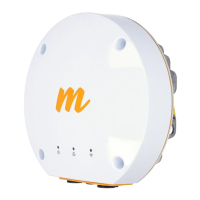B11 User Guide
Mimosa Networks Help Site Link
Copyright © 2015 Mimosa Page 24
TDMA Configuration Settings
The TDMA Configuration panel contains controls for configuring and fine tuning TDMA performance. One side of the
radio link must be set as an Access point, and the other set as a Station. The Station inherits the other settings from
the AP, so the other fields are grayed out and not accessible when Station is selected.
B5/B5c
Wireless Mode - Choose whether the device will act as an Access Point or a Station.
●
Gender - Traffic Split - The radio can be configured to allocate bandwidth symmetrically (50/50) or biased
●
towards downstream (75/25) in environments where traffic direction is expected to be heavier in one direction
than the other. With an asymmetrical split, the local radio is represented first in the slash notation,
(local/remote). For example, in the (75/25) split, the local radio gets 75, while the remote radio gets 25. If
"Auto" is selected the radio will automatically determine, based upon traffic flow, which ratio will be used. The
radio will continue to evaluate the flow and adjust accordingly.
TDMA Window - Determines the length of the transmit time slot in milliseconds.
●
Note: To enable spectrum reuse, both Gender-Traffic Split and TDMA Window must each be set to the same value for all collocated
radios. Further, "Auto" must not be selected as the TDMA Window when radios are collocated.
B5-Lite
Wireless Mode - Choose whether the device will act as an Access Point or a Station.
●
Traffic Split - The radio can be configured to allocate bandwidth symmetrically (50/50) or biased towards
●
downstream (75/25) in environments where traffic direction is expected to be heavier in one direction than the
other. With an asymmetrical split, the local radio is represented first in the slash notation, (local/remote). For
example, in the (75/25) split, the local radio gets 75, while the remote radio gets 25. If "Auto" is selected the
radio will automatically determine, based upon traffic flow, which ratio will be used. The radio will continue to
evaluate the flow and adjust accordingly.
TDMA Window - Determines the length of the transmit time slot in milliseconds.
●
B11
Wireless Mode - Choose whether the device will act as an Access Point or a Station.
●
Gender - Traffic Split - The radio can be configured to allocate bandwidth symmetrically (50/50) or biased
●
towards downstream (75/25) in environments where traffic direction is expected to be heavier in one direction
than the other. With an asymmetrical split, the local radio is represented first in the slash notation,
(local/remote). For example, in the (75/25) split, the local radio gets 75, while the remote radio gets 25. If
"Auto" is selected the radio will automatically determine, based upon traffic flow, which ratio will be used. The
radio will continue to evaluate the flow and adjust accordingly.
TDMA Window - Determines the length of the transmit time slot in milliseconds.
●
Note: To enable spectrum reuse, both Gender-Traffic Split and TDMA Window must each be set to the same value for all collocated
radios. Further, "Auto" must not be selected as the TDMA Window when radios are collocated.

